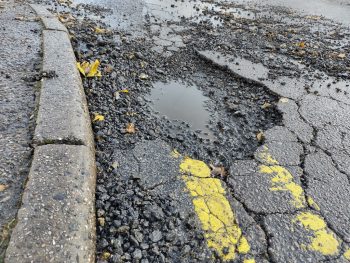Backlog of road repairs in England and Wales hits £14bn
More than £14bn is now needed to fix the backlog of local road repairs in England and Wales – and the work would take an average of 11 years to complete.

A total of 1.4 million potholes were filled over the last year; equivalent to one every 22 seconds
That’s according to the latest Annual Local Authority Road Maintenance (ALARM) report, which provides an insight into the state of local roads in the two nations.
Published by the Asphalt Industry Alliance (AIA), the figures for the last year make for bleak reading.
Nearly one in five local roads, covering nearly 37,000 miles, in England and Wales are in such a bad state that they have less than five years of life remaining.
And while half (51%) of local roads are reported to be in good structural condition, the remainder, more than 100,000 miles, could, without appropriate maintenance measures, continue to deteriorate to the point of needing to be rebuilt within the next 15 years.
In the last year, local authority highway teams in England and Wales only received around two-thirds of what they needed to stop our local roads from further deterioration.
The data shows that in the last year, the gap between what local authorities received and what they said they would have needed to keep roads to their own target conditions and prevent further decline is now £1.30bn – a jump of more than 20% on last year’s figure and the highest amount reported in 28 years of successive ALARM surveys.
While the AIA said the extra £200m pledged in the Spring Budget was welcome, it’s “just not enough”.
Rick Green, AIA chair, said: “It represents around 20% of the average shortfall in English local authorities’ annual budgets and will do little to improve overall structural conditions and stem further decline.”
The latest report also finds that local authorities would have needed an average of an extra £7.7m each last year just to reach their own target road conditions.
A total of 1.4 million potholes were filled over the last year – down from 1.7 million in the previous year – and equivalent to one every 22 seconds. Overall, £93.7m was spent filling potholes in 2022/23 and the total spent over the last 10 years is more than £1bn.
The average frequency of resurfacing for all classes of roads now stands at once every 116 years.
Rick Green added: “To really improve conditions and create a safe, resilient and sustainable network, what’s needed is a longer-term funding horizon from central government with more highway budget ring-fencing. This would help local authority engineers to plan effectively and implement more efficient works to protect and enhance the resilience of the local road network.”
The Kwik Fit PIT Report 2023 reveals that the annual cost of repairs to British drivers totalled £1.7bn
Pothole damage forces 2.7 million cars off the road
New research out from Kwik Fit reveals the toll that our crumbling roads are taking on drivers.
Its annual PIT Report (Pothole Impact Tracker) shows that over the last 12 months, pothole damage has forced nearly 2.7 million cars off the road. In the year to March 2023, 13.1 million drivers suffered damage to their car after hitting a pothole, and of these, one in five had to do without their vehicle for more than a week while it was undergoing repairs.
More than half (57%) of British drivers say they have hit at least one pothole a week over the last 12 months, with the impact causing damage to over 13 million cars. The average repair bill faced by each driver was £127, resulting in a total cost to the nation’s motorists of £1.7bn.
It’s a decade since Kwik Fit first carried its study into the cost of repairing the damage from pothole impact and the company’s research shows that since 2013, the total cost of pothole reports to British motorists has more than doubled – rising by 121%. This is despite the number of cars on the nation’s roads increasing by only 10% over the same period.
Nearly half of all drivers (47%) agree with the AIA that a portion of the money the Government raises through fuel duty and road tax should be ringfenced for improving road surfaces. Only one in 10 drivers (10%) say they would be prepared to pay more fuel or excise duty for direct spending on road surfaces. A similar small minority (10%) would be happy to pay more council tax if it was ringfenced for roads in their local area.
27% of UK drivers have damaged their car on an undetected pothole
More than a quarter (27%) of UK drivers have damaged their car on an undetected pothole, according to new research from Škoda.
Published to coincide with the ALARM report, the research found the most common damage sustained by a pothole is a tyre puncture, while the average cost for repairs stands at more than £200.
Škoda cars are equipped with a Local Hazard Information Service via the Connect online services, which warns the driver about upcoming poor road conditions through the infotainment screen. The service is based on swarm data intelligence; the more cars to supply data, the more precise the predictions become, potentially averting damage such as tyre punctures and tracking misalignment.















